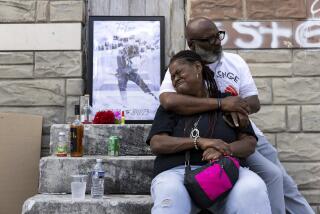Victims’ Families Try to Make Sense of Tragedy
- Share via
ATLANTA — He was hurting. So, he hurt.
And so a pediatrician in Peachtree City will come home every night to an empty house. And a teenage son will never again taste his mom’s famous black rum cake.
He was angry. And so a 3-year-old boy won’t again giggle with his daddy at the beach. And a wife will never again pray with her husband.
Mark Orrin Barton wrote a note before he grabbed a pistol in each big hand, before he stalked two office buildings shooting to kill. In that note, he said he was gunning for those who “greedily sought my destruction.”
Instead, he hit Vadewattee Muralidhara, 44, the pediatrician’s wife who made black rum cake for her two children every Christmas. He also hit Allen Tenenbaum, 48, a grocery executive who loved nothing better than to help out at his temple and romp with his three young kids at the beach.
Barton’s victims were not, as far as anyone knows, his personal enemies.
They had no vendettas against him. Most didn’t even know him.They just happened to be in the brokerage firms when he pulled out his guns and began blazing.
Barton’s first three victims were his family members: his wife and his two young kids, slain in their home in an Atlanta suburb. In suicide notes, Barton said he regretted killing them. “I am so sorry,” he wrote.
He expressed no such remorse for the men and women he shot dead in the brokerage firms.
They were young professionals and retirees. A homemaker and a synagogue president. Fathers and a proud new grandpa. One was planning to travel the world, golfing at every famous course he could find. Another was gearing up for a Chuck E. Cheese birthday party: His daughter was turning 4. Tenenbaum, an Atlantan born and bred, was hoping to visit Israel next year. Muralidhara, a recent immigrant from Trinidad, was proud as could be that her daughter would soon apply to medical school.
Barton may have thought his victims--may have thought the world--were out to get him. But he didn’t know, Muralidhara’s son Rishi said fiercely as his father wandered their house vacant-eyed and neighbors timidly approached bearing flowers.
“He didn’t know the people he killed,” Rishi Muralidhara, 18, said. “He didn’t know their families.”
A few families tried on Friday to tell their stories, tried to put human faces on the latest sad roster of anonymous victims.
Across this stunned city, others spoke of the horrors they had watched on television as the carnage spun wild, of workers fleeing their offices, of SWAT teams storming the scene, of sobs, screams, blood, panic. To be sure, the families also experienced unfathomable terror on Thursday. Just imagine: knowing that their loved ones were there, there where the gunman rampaged. Trying to reach them on cell phones. Trying again. Again. Again. Waiting for a reassuring call that never came. Dreading a grim notification that did.
But it was easier to talk Friday about happier times. Together times.
Tenenbaum’s brother-in-law paused on his way to the cemetery, his tanned face weary, his dark suit wilting in the merciless sun, to smile about past golf games. Tenenbaum, he said, was a fair player. OK, pretty good. His handicap was 12. “He was a wonderful man,” Freddy Robinson said. “Just real special. His kids, they were the most important thing to him.” Tenenbaum’s two daughters are 11 and 13. His baby boy is 3.
The president of the Or Ve Shalom Synagogue, Tenenbaum had been day trading when Barton drew his guns.
So had 52-year-old Dean Delawalla, who was killed a few days before his daughter’s fourth birthday party.
Edward Quinn, 58, had been at the brokerage computers as well, buying and selling stock. His hobby. A father of three--who this month got to cradle a newborn grandson--Quinn had worked his way up in more than three decades at the United Parcel Service, rising from entry-level package handler to corporate loss prevention manager. He retired four years ago to travel and golf. “He was the kindest man ever,” one of his sons said Friday.
Kevin Dial had not been day trading. The 38-year-old was the office manager at Momentum Securities. And the son of former NFL football player Buddy Dial, a wide receiver for the Pittsburg Steelers and Dallas Cowboys. “The guy always had a smile on his face,” a friend said Friday. “He was really upbeat. A very, very nice guy.”
As for Muralidhara, her son remembered so many good times with her--and with every memory, he seemed to wince and ask why.
Why would a stranger take away the mom who had always backed him up, always believed in him. “Even,” he said, “if my story had 2,000 holes in it.”
The son had heard the presumed motive: Barton had lost big money in the stock market. “Big deal,” Rishi said.
Why did that mean he could kill?
Kill a mother who--although she looked so demure--once let loose with a scream the whole stadium heard when her son tripped while playing tennis. A mother who, although devoutly Hindu, visited synagogues and churches and studied B’hai in a quest to understand other religions. A mother who always had warm dinners waiting when her kids and their friends came home from school.
“That’s something I’m not going to be able to get any more,” Rishi said, looking down. “She made a great lasagna.”
Rishi said his mom was an apprentice day trader, taking a 30-day training course in Atlanta. A former banker, she watched only financial news on TV and studied a business journal daily. She loved stocks, he said, but never sought to get rich trading. “She didn’t invest thousands, she invested hundreds,” Rishi said.
There’s an irony to Muralidhara’s murder.
Her family had moved to Georgia from Trinidad and Tobago in 1994 to escape crime. They had been held up on their doorstep in Trinidad, at gunpoint. They thought they were safer here.
Dr. Kesturkoppal Muralidhara knows now, with pain, that violence comes to Atlanta too. He was exhausted Friday, and friends said he was still in shock. But he tried to speak, just a bit, about his wife of 22 years. “She has been with me all the time,” he said, unable to use the past tense. “She is my backbone.”
His eyes told all, but he said it nonetheless, so softly his very voice ached: “I’m going to miss her a lot.”
He won’t go back to Trinidad, however. Or to India, where his own family lives. “That would show I’m cowardly,” he said. “I should stay here.”
His son vows to stay with him, at least for a time. Rishi said he’ll likely skip his next semester at Georgia State University and move back to the family’s graceful stucco home.
“I’m going to take care of my dad,” he said. “Otherwise, every day he’ll come back to an empty house.”
Times researchers Edith Stanley in Atlanta and John Beckham in Chicago contributed to this story.
* GUN CONTROL DEBATED
Congress breaks logjam and takes step toward passing gun control legislation. A16
* FALLOUT FROM ATLANTA
The massacre in Atlanta raises some serious questions for day-trading firms. C1
More to Read
Sign up for Essential California
The most important California stories and recommendations in your inbox every morning.
You may occasionally receive promotional content from the Los Angeles Times.










